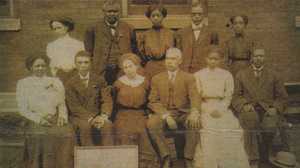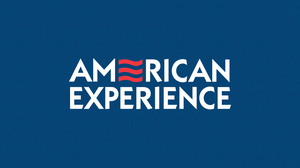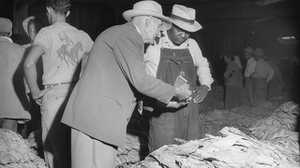Protest & Resistance
In the 1950s, race relations were changing in segregated America. The Supreme Court had finally admitted in the 1954 Brown v. Board of Education decision that segregation violated the constitutional rights of American citizens. The court ruled that integration should happen "with all deliberate speed."
Many young African Americans took on racial discrimination in their own way. One method was the sit-in. To protest segregation peacefully, the students simply sat down in places, such as lunch counters, that were restricted to whites only.
The Nashville sit-ins commenced on April 3, 1961, the day after Dr. ALfred Blalock's 60th birthday gala in Baltimore. That event was the crowning moment of Blalock's career, and it was held at the segregated Southern Hotel. Vivie Thomas, who had worked with Dr. Blalock since 1929, was not invited.
Kwame Lillard and Elizabeth McClain, whose civil rights activism spans decades, were leaders of the Nashville sit-ins. Here, they discuss their early experiences with resistance.

Kwame Lillard
What was a good example of how you protested?
We were looking for targets. You've got to understand you've got these twenty year olds who can think they can change the world. They need more targets. Get more oppression, more racism to attack.
It was a hot July and me, Freddie, and Doctor Walker's son were sitting in the student center office with nothing to do and we said, "Let's go swimming." And let's go swimming to the biggest, most prestigious, glamorous white swimming pool in Nashville, the ones you can't even -- in a pool, in a park that you can't even drive in except once a year, which is on Christmas. Centennial Park was a park you could drive in once a year when they put the glorious Nativity scenes there. They allowed black folks to drive through it at about 10 miles an hour without stopping. You could view the Nativity scene, the birth of Jesus, once a year for 10 minutes.
So I said, "Let's go to that pool and integrate it."
So we walked to the pool, hot, hot, hot day, with our towels and we knew what they'd tell us as soon as we got there. They said, "You can't swim here." And we said, "No problem. We ain't leaving."
There was an edict sent out by Mayor West within 10 minutes of us arriving at the entrance to pay our 20 cents to swim, to drain that pool. But then, in the way racism works, he couldn't just drain the premier pool in the city and leave all the others because he knew we'd go there. Smart! That's what we were going to do.
So he drained every pool in Nashville. For three years there were no pools for swimming in Nashville. And when they asked us why we did it and did we feel bad about it? We said the only thing we feel bad about was that the fact there were going to be a lot of white kids that were going to get drowned in the rivers and the creeks because of a racist mayor that won't let them swim in pools. And it happened — it happened just the way we said.
Was non-violence your guiding principal?
When we looked at what we did, '61 summer. We went through all of the different attacks. The last major issue was jobs. Jobs at the stores we were protesting. Well to get jobs, the first jobs we wanted were the jobs at the AC Hill's food chain - it was a big food chain in Nashville called AC Hill's. They were everywhere. That summer of '61 we decided to attack AC Hill's for jobs — not to pee in the toilet, not to eat in the place, but to become part of the economic wealth of the nation.
And that was a serious departure from public accommodation to the right for some economic parity. That's a whole different movement. And that was frightening in Nashville was frightening to the folks in the senior positions in the movement because at that point we had to depart a little bit from non-violence. Because what would happen is that we would go to the stores to get a picket line started at AC Hill's, the cops would come, the hoodlums would come, paid by AC Hill's to annihilate us. And that got to be very disturbing.
So what I did, was get by my high school buddies, since I was Nashvillian, to serve as a National Guard for us. Well that violated all of the non-violent principles of King's movement and Gandhian thought. But we were able to sustain the movement and break the AC Hill's chain policy of not hiring black folks. But it was a clear indication that we were not following non-violent principles. And I think that was a real departure for us. And when you look and think of economics you've got to find a way to break the back of the economic system.
What is the legacy of your activism?
To be honest, I think in the words of Malcolm, we were hoodwinked. We got conned. We got conned into believing the solution of our movement was to get the right bill passed, get the right agencies funded, get the right person elected in office and get the right amount of credit and the right house in the right neighborhood.
And what we were doing essentially is buying into a fallacious lie that the whole movement was based on making us white. And that was totally unacceptable. It could not sustain itself.
It did not sustain itself. You can't give to that to a generation of people who are black that what you do is now we've sacrificed you to be white. They rejected that. You can only explain going from -- going from sit ins to drive-by shootings is it's a whole hellish disconnect between what we were sacrificing, what our goals were, and what the next generation has thought we were doing and what we thought we were achieving.
Obviously they didn't buy into it, because what we gave them was a right to be white. And they rejected that. That's why they got rap music. That's why they got gangsters. Some kind of way, the non-violent movement, the movement to change American laws should have said it's okay to be who you are and still achieve. And we didn't do that.
How can people keep the spirit of the civil rights movement alive today?
Let's say from here on out, as we encounter people, as we teach people, as she share what we've learned, that we tell people, you start something today, it may not be successful, but just start it. And if you don't succeed in that one, start something else. Never feel that you have to have ten fellows behind you. With the Internet, never feel that somebody is going to hold information from you. Get down to the libraries. Get down to your colleges and find out who, in fact, does contribute to that black candidate that you love so much and find out why that black candidate does never show up in critical times. Don't be so jaded with every black leader who comes out and says, "I'm for you."

Elizabeth McClain
What day-to-day realities prompted students to stage sit-ins?
Blacks who worked downtown had to go, if they wanted to eat, would go into places like Tick Tock's and Krystal's and get their hamburgers and then go on the outside to eat it.
You know you stood on the right end of the counter until they brought your hamburger, or until they brought your hot dog. And then you took it and you went outside and you ate and then you went back to your job.
There were so many things that were like this.
Did you have an emblamatic protest song?
One song I think we sang more than any song as we marched downtown was I Ain't Gonna Let Nobody Turn Me Around. We sang that song each time, and we would march from Tennessee State University down to Fisk, and the high school students would join us as we marched, and then we'd go all the way downtown. And persons in the neighborhood would join us, and that's the one song that everybody knew, so that song was sung more than any others.
Turn me around, turn me around, turn me around. Ain't gonna let nobody turn me around, gonna keep on a walkin', keep on a' talkin', marchin' down the freedom lane.
And we did it, and then each one of the cities added a verse in that would affect that city. For instance, "I ain't gonna let Bull Connor..." and then each one of the others - you went to Selma - you added in their Chief Pritchett, you'd add in those persons.
Is the job you set out to do un-finished?
Yes. Yes. Definitely. And one of the reasons why I see it as unfinished is because persons look at the physical things. They look at the fact that you can go to a theater and you can go to a movie. And you can sit on the front of a bus. And you can go down and buy a car that you'd like or a house in neighborhoods and all of this.
But we lost our children. The generation behind us did not have a movement, meaning they didn't see a need to fight. So, therefore, I'm looking at a whole generation of people who cannot find a major cause.
And yet, they're there. I can see them. They're invisible, but I can see them. We can see them. But they can't. We didn't teach them there was a cause. There's always a cause.







